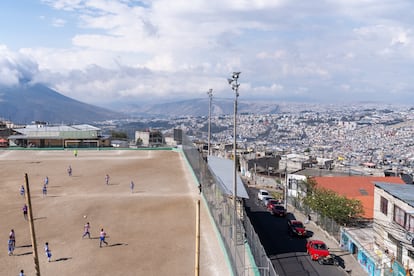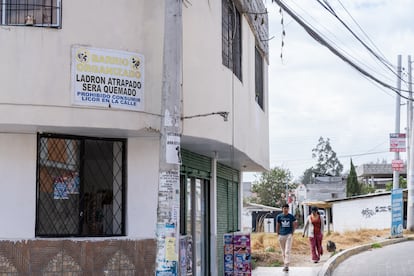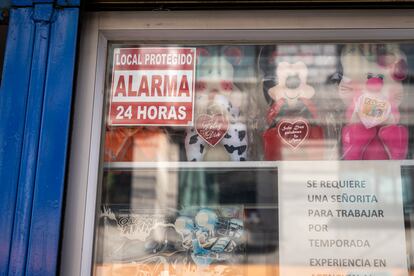‘Thieves caught will be burned:’ Quito’s neighborhoods take security into their own hands
Rising violence in Ecuador and the lack of a police presence in many areas of the capital has led residents to form vigilante groups to tackle criminals


The residents of the Zavala neighborhood of Quito ventured out several nights in a row with their heads covered and sticks in their hands. On one occasion, they caught a criminal and the younger members of the group beat him up. The following day, the police arrived, asking questions. “The officers came looking for us,” says Margot Sierra, 54, dumbfounded, outside her clothing store in this poor neighborhood in the north of the Ecuadorian capital. As the night patrols had little effect, the residents also pasted posters on street corners with a very clear message: “Organized neighborhood. Thieves caught will be burned.” Sierra has lived in Zavala for 30 years and has never seen anything like this. The rampant increase in violence throughout the country is beginning to creep into the homes of ordinary Ecuadorians, who are taking matters into their own hands in the face of growing insecurity.
The first time a vacunador (extortionist) tried to intimidate shopkeepers in Atucucho, a neighborhood in the capital that stands at 3,100 meters above sea level, he was met head-on by Marta Sánchez. She and other shopkeepers in this neighborhood of steep streets — with 30,000 residents and 10 murders registered in July alone, where it is rare to come across a policeman — installed interconnected alarms a few months ago. When a button is pressed, all the alarms in the street start ringing at once. Sánchez, inside a dimly lit cybercafé where the kids spend the afternoons hanging out on the internet, pushed the button two months ago. Within seconds, the owners of the businesses in the street had captured an extortionist trying to charge them a forced monthly fee for security that nobody was going to provide.
He was handed over to the police but, due to a lack of evidence, he was released the same day. The merchants, though, remain euphoric. “We want the bad guys to realize that we are not alone; a united people is strength,” says Leonardo Vega, owner of a stationery store. Days later, 3,000 residents marched through the unpaved streets, crowned by a tangle of cables, to demand that the government ramp up the police presence in the neighborhood. The extortionists, says local resident Manuel Titani, have not been seen again. But neither have the police, for the time being.

Insecurity is not only an issue in the poorest neighborhoods; community-driven action is increasingly being undertaken throughout the city. Online chat groups between residents have multiplied, in which warnings are circulated, such as this one from the El Belén area: “Last week two thugs were caught in the neighborhood. They stole two cars. Today they are in the parking lot with the police cleaning up because they were sleeping there. We need to unite for the safety of ourselves and our families.” There has also been a proliferation of police tents that advertise themselves as “safe spots” to act as a deterrent, although often there are no police officers in them. The warnings to thieves posted in Quito’s neighborhoods have several variations. They all begin with “thief caught” but the consequences range from being burned or lynched to being handed over to the authorities. Citizens have become accustomed to living under a shroud of fear and the city’s streets empty when the sun goes down. Restaurants are welcoming fewer customers. Nobody feels safe anymore, especially after the recent presidential election campaign, marked by a surge in violence.
Ecuadorians voted Sunday in the first round of the elections, with the country still shocked by the assassination of presidential candidate Fernando Villavicencio, who was shot while leaving a rally in Quito. Luisa González, the candidate for former president Rafael Correa’s Citizen Revolution Movement, and millionaire businessman Daniel Noboa made it to the second round and will face each other in a runoff on October 15 for the presidency of a country that is demanding an end to the violence sweeping what until recently was considered an an oasis of peace in a region marked by insecurity. Both González and Noboa talk about tackling violence, but neither has explained in detail how they will go about it. Finding a solution will not be easy, although the source of the problem is a familiar one in Latin America: drug cartels fighting over territory and control of trafficking routes.

The situation has become so serious that on Sunday the organizers of the election programs congratulated themselves on the fact there had been no casualties. So far this year there have been 4,574 violent deaths and if the current homicide rate continues, Ecuador will become one of the most violent countries in the world. Minister of the Interior Juan Zapata said that 100,000 police officers were deployed on election day and the country remains under a state of emergency imposed after Villavicencio’s assassination. When asked if such a security shield could be rolled out on a daily basis, he replied sincerely: “There are shifts, we have to give them breaks; it is not possible.”
In Zavala, Margot Sierra says that the police have promised 15 motorized vehicles will be deployed in the neighborhood to protect the area and she is counting the hours until their arrival. However, she is not happy today. On Sunday she voted for Jan Topic, who did not receive enough support to progress to the second round. Next to her store, the face of the candidate who promised a tough stance against crime decorates the walls of the street. Around two weeks ago, a group presenting themselves as members of Topic’s campaign staff visited Sierra and other shopkeepers and installed cameras connected to the internet for free. She points to it proudly; from the store entrance the images go straight to her cellphone. “The vote is secret, but I’m voting for Topic because they gave us security cameras,” she explains.
Sign up for our weekly newsletter to get more English-language news coverage from EL PAÍS USA Edition
Tu suscripción se está usando en otro dispositivo
¿Quieres añadir otro usuario a tu suscripción?
Si continúas leyendo en este dispositivo, no se podrá leer en el otro.
FlechaTu suscripción se está usando en otro dispositivo y solo puedes acceder a EL PAÍS desde un dispositivo a la vez.
Si quieres compartir tu cuenta, cambia tu suscripción a la modalidad Premium, así podrás añadir otro usuario. Cada uno accederá con su propia cuenta de email, lo que os permitirá personalizar vuestra experiencia en EL PAÍS.
¿Tienes una suscripción de empresa? Accede aquí para contratar más cuentas.
En el caso de no saber quién está usando tu cuenta, te recomendamos cambiar tu contraseña aquí.
Si decides continuar compartiendo tu cuenta, este mensaje se mostrará en tu dispositivo y en el de la otra persona que está usando tu cuenta de forma indefinida, afectando a tu experiencia de lectura. Puedes consultar aquí los términos y condiciones de la suscripción digital.








































